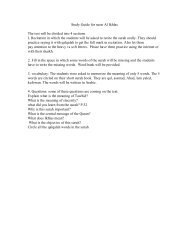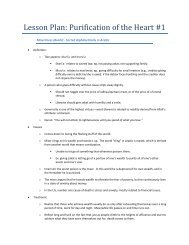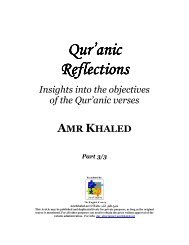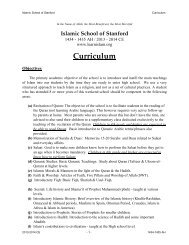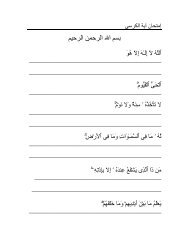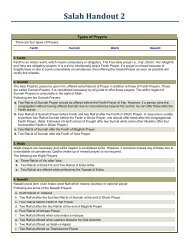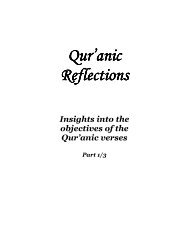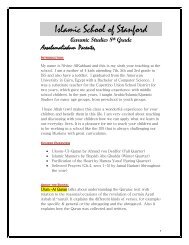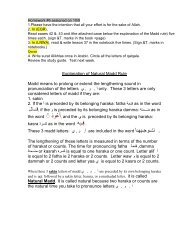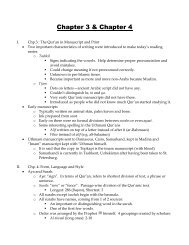Quranic Reflections - Islamic School of Stanford
Quranic Reflections - Islamic School of Stanford
Quranic Reflections - Islamic School of Stanford
Create successful ePaper yourself
Turn your PDF publications into a flip-book with our unique Google optimized e-Paper software.
lessed wheresoever I be, and has enjoined on me Salat (prayer), and Zakat, as<br />
long as I live. “And dutiful to my mother, and made me not arrogant, unblessed<br />
(TMQ, 19:30-32).<br />
Children’s duty towards their parents<br />
Surat Maryam is one <strong>of</strong> the Qur’an Surahs that strongly focus on duty towards one’s<br />
parents. That was indeed Yahya’s (AS) most important trait. This is clear as Allah<br />
(SWT) says what can be translated as, “And dutiful towards his parents” (TMQ,<br />
19:14), and so was Isa (AS), “And dutiful to my mother” (TMQ, 19:32).<br />
Apparently, a child cannot be dutiful towards his parents unless he is brought up in a<br />
good and right environment. Hence, Surat Maryam makes clear to the parents that<br />
they have to prepare their children to carrying the trust <strong>of</strong> religion and defending it.<br />
By doing so, they enjoy their children’s righteousness and obedience and will be<br />
greatly rewarded by Allah (SWT) in the hereafter.<br />
Ibrahim (AS) and his father<br />
The following Ayahs refer to a completely opposite example: Ibrahim (AS) a son who<br />
believed in Allah (SWT), and who was trying to help his father get to the right path.<br />
He was so merciful toward his father that he kept calling him in a loving and tender<br />
manner to Allah (SWT). Allah (SWT) describes Ibrahim’s (AS) situation saying what<br />
can be translated as, “O my father! Why do you worship that which hears not,<br />
sees not and cannot avail you in anything “O my father! Verily there has come<br />
to me <strong>of</strong> the knowledge that which came not unto you. So follow me, I will guide<br />
you to the Straight Path.” (TMQ, 19:42-43).<br />
Try to learn, our youth, from Ibrahim (AS) the good manners in calling to Allah when<br />
talking to the elder people, especially your parents. People mostly repel from religion<br />
because <strong>of</strong> ill-mannered youths who are religious, but at the same time do not address<br />
people politely. Allah (SWT) says what can be translated as, “O my father! Worship<br />
not Shaitan (Satan). Verily Shaitan (Satan) has been a rebel against the Most<br />
Gracious (Allah). “O my father! Verily I fear lest a torment from the Most<br />
Gracious (Allah) should overtake you, so that you become a companion <strong>of</strong><br />
Shaitan (Satan) (in the Hell-fire).” (TMQ, 19:44-45).<br />
Although his father was a disbeliever, Ibrahim (AS) treated him so politely and<br />
righteously that Allah (SWT) granted him his two good sons. Allah (SWT) says what<br />
can be translated as, “So when he had turned away from them and from those<br />
whom they worshipped besides Allah, We gave him Ishaq and Yaqub, and each<br />
one <strong>of</strong> them We made a Prophet. And We gave them <strong>of</strong> Our Mercy (a good<br />
provision in plenty), and We granted them honor on the tongues (<strong>of</strong> all the<br />
nations, i.e. everybody remembers them with a good praise).” (TMQ, 19:49-50).<br />
His being righteous and dutiful to his father was the reason <strong>of</strong> his having two good<br />
sons, who were “a delight <strong>of</strong> the eye” (dear ones) to him, and who shouldered the<br />
responsibility <strong>of</strong> carrying the lantern <strong>of</strong> religion after him.<br />
Isma’il (AS) (He commanded his family to perform the prayers and pay Zakat<br />
“Alms”)



